

Both and Either or Neither nor. Either, Neither or Both. Question tags. Exercise on Question Tags. What Are Relative Pronouns? Our Story Relative Pronouns A relative pronoun is a pronoun that heads an adjective clause.
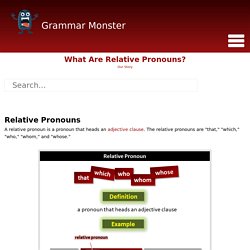
The relative pronouns are "that," "which," "who," "whom," and "whose. " Here are some simple examples: That The dog that stole the pie is back. (The relative pronoun is bold. The Function of Relative Pronouns The function of a relative pronoun is to head (or introduce) an adjective clause. . (1) To identify it. For example: The man who won the lottery is outside. Inspector Smith, who won the lottery, is outside. Click on Two Relative Pronouns Getting ready... More Examples of Relative Pronouns In each of these examples, the relative pronoun is bold and the adjective clause is highlighted. Real-Life Examples of Relative Pronouns The following relative pronouns head adjective clauses that identify their nouns.
Why Should I Care about Relative Pronouns? Here are the six most frequently asked questions related to relative pronouns: (Question 1) Do you put a comma before "which"? Top Tip Another Top Tip Yes. See Also. Relative pronouns - who, which, whose - Exercise. Conditionals - zero, first & second conditionals. Conditionals. Zero, First, and Second Conditional (Study English Today) 1.
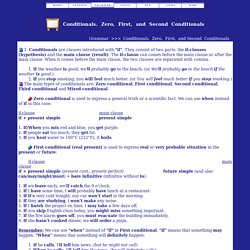
Conditionals are clauses introduced with "if". They consist of two parts: the if-clauses (hypothesis) and the main clause (result). The if-clause can comes before the main clause or after the main clause. When it comes before the main clause, the two clauses are separated with comma. 1. 2. The main types of conditionals are: Zero conditional, First conditional, Second conditional, Third conditional and Mixed conditional.
Zero conditional is used to express a general truth or a scientific fact. If-clause main clause if + present simple present simple. Englishtenses. Intermediate grammar exercise: first conditional vs. second conditional (1) First & Second Conditional Exercise. English Grammar Lesson: Comparatives and superlatives. Comparisons (comparative and superlative) - English grammar tutorial video lesson. Comparatives and superlatives. Comparative - Superlative. Fill in the gaps with the comparative form of the adjectives given. 1.
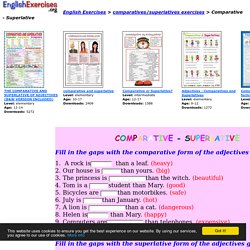
A rock is than a leaf. (heavy) 2. Our house is than yours. 3. The Passive. An active sentence like I drank two cups of coffee has the subject first (the person or thing that does the verb), followed by the verb, and finally the object (the person or thing that the action happens to).
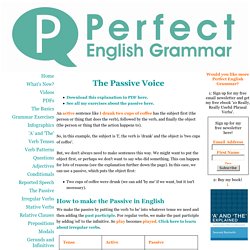
So, in this example, the subject is 'I', the verb is 'drank' and the object is 'two cups of coffee'. But, we don't always need to make sentences this way. We might want to put the object first, or perhaps we don't want to say who did something. This can happen for lots of reasons (see the explanation further down the page). In this case, we can use a passive, which puts the object first: Two cups of coffee were drunk (we can add 'by me' if we want, but it isn't necessary). Comparatives and superlatives. Passive Voice - English Lesson. Passive Verbs Exercise 1. Passive Verbs Exercise 2. Passive Verbs Exercise 3. Passive Verbs Exercise 4. Used to vs. Be used to. In Azar's Understanding and Using English Grammar, (be) used to is included among verb + preposition combinations, which followed by gerunds.
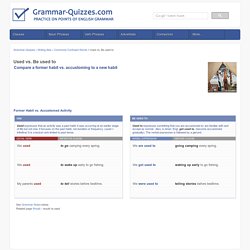
(Azar 14-2 "Using Gerunds as the Objects of Prepositions) be used to doing something. be accustomed to doing something. be commited to doing something In linguistic description, used to is an adjectival passive followed by an infinitival nonfinite clause (a "reduced" clause). used to We are used to [warm weather/ going to the beach.] adjectival passive + PP + NP / nonfinite clause (infinitival) "There are a few adjectives that are morphologically related to the past participles of verbs but whose meaning has changed so that they are no longer comparable to verbal passives with the same form and its connection with passives proper is purely historical. " bound, engaged, meant, numbered, related supposed, used (Huddleston 16 §10.1.3) We are engaged to be married. / He was supposed to be… / He was bound to leave… / He was meant to lead…